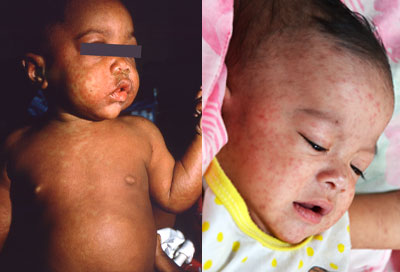Ongoing measles outbreaks have many families concerned. Most people who have gotten sick were not vaccinated against measles. This is a stark reminder of the importance of making sure your children are fully vaccinated.
Here are answers to
questions many parents have about the ongoing measles outbreaks and step you can take to protect your family.
I thought measles was a mild illness, so why the alarm now?
Measles was once a common childhood disease, almost an expected part of growing up. While most children recovered from the measles without problems,
many others did not. In some children, the infection caused pneumonia and in a few, encephalitis
(infection of the brain) and even
death.
Before the
measles vaccine was available in the U.S., each year an average of 450 people died from measles; most of them were previously healthy children. Thanks to the measles vaccine, we can now protect children from the measles. In recent years, however, some parents have refused or delayed vaccinating their children out of fear or
misinformation about
the safety of the measles vaccine. This means there are more unvaccinated children, teens and adults in our communities.
Record-breaking measles outbreaks
There were more than 2,100 confirmed measles infections across at least 43 U.S. states in 2025, more cases than in any year since 1991. This included Texas, where 2 unvaccinated children died from measles. So far in 2026, there have already been more than 700 confirmed cases of measles. Outbreaks have also been reported in Mexico and Canada, which lost its measles elimination status as of November 2025. Vaccination is the best way to keep communities healthy and prevent more outbreaks.
Vaccination recommendations in outbreak areas
Additional or early vaccination may be recommended in areas where measles continues to spread. For example, health departments may recommend a second dose for children age 1 to 4 years who received one dose and live in or plan to
travel to the outbreak area. An early dose may be recommended for
infants age 6 through 11 months living in or traveling to outbreak areas. Children who have not received any MMR vaccine may need two doses 28 days apart.
Choosing not to vaccinate your children not only leaves them susceptible to measles but also exposes other children to measles. This includes infants who are
too young to be vaccinated and those who are unable to be vaccinated due to other health conditions.
(See "Should children who have not had a measles vaccine go to school during an outbreak?")
How is measles spread?
The measles virus spreads easily through the air when an infected person sneezes or coughs and someone nearby inhales the infected droplets. It can also be transmitted by direct contact with fluids from the nose or mouth of an infected person.
How long can the measles virus live on surfaces?
Measles is one of the most contagious infectious diseases known. The virus can live for up to 2 hours in the air where infected people have coughed or sneezed, or on surfaces they may have touched. As a result, anyone in crowded, public spaces may come into contact with measles.
What are the signs & symptoms of measles?
The most recognizable measles symptom is a very high fever accompanied by a red or brownish blotchy rash, although this is not the only symptom.

Before the rash appears, children with measles develop cold-like
symptoms, including:
Cough
Runny nose
Fever
Red, watery eyes
These symptoms tend to get worse during the first 1 to 3 days of the illness.
When do children need to get the measles vaccine?
The American Academy of Pediatrics (AAP) recommends children receive the
measles, mumps and rubella (MMR) vaccine at age 12-15 months, and again at 4-6 years. Children can receive the second dose earlier if it is at least 28 days after the first dose.
There is a combination vaccine called MMRV that contains both
chickenpox and MMR vaccines. MMRV is an option for some children 12 months through 12 years of age.
What if my baby is too young for the measles vaccine?
High immunization rates in a community protects those who are too young to be vaccinated, including infants under 12 months of age. These infants are at the highest risk of serious illness, hospitalization, and death due to measles. Find information on
vaccines for infants age 6-12 months old during an outbreak or before international travel to a location with an active measles outbreak.
What we know about the safety of the measles vaccine?
Getting the measles vaccine is a better way to strengthen their immune system
than getting a measles infection. Occasional effects after the measles vaccine include fever, tenderness at the injection site and rash.

Speaking Up for Vaccines & Our Health
By: Arin Parsa

Back when the COVID pandemic hit, my life, similar to so many teens across the world, changed dramatically. We lived in isolation, unable to visit friends and family, worried about our aging grandparents and younger siblings. But thanks to the vaccine, we were able to reclaim some normalcy in our lives.
Unfortunately, despite billions of life-saving vaccines given worldwide, disinformation continues to surge. Routine vaccination rates have also dropped to dangerous levels.
Measles cases have risen, spreading within schools and communities where parents, swayed by false claims, refused to vaccinate their children.
My parents immigrated from India, where they witnessed rampant
polio cases in low-income neighborhoods where people do not have access to vaccines. So, they made sure that I got a doctor
checkup every year and kept my shots up-to-date. I got vaccinated against COVID, human papillomavirus (HPV), measles, meningitis, flu and other dangerous diseases without hesitation. I did this because I believe in the science of vaccines to protect myself and reduce the chance of spreading diseases to others.
Vaccines are a modern miracle of public health. They're not perfect, but the alternative to vaccines is one where our lives and futures are held hostage to deadly pathogens. Science, love and a commitment to protect each other are the only ways we can conquer diseases.
Arin Parsa is the founder of
Teens for Vaccines Inc.
Arin's story originally appeared on the Voices for Vaccines
blog.
How long does immunity last from the measles vaccine?
The measles vaccine is very effective in protecting against measles. However, no vaccine is 100% protective so very rarely, people who are vaccinated may develop measles. About 95 of every 100 people will be protected after getting one dose of the MMR vaccine. Two doses of MMR protect 97-99 of every 100 people.
I'm not sure if I've received measles vaccine. Do I need a booster?
If you are not sure if you or your children have been fully vaccinated against measles, talk with your doctor to see if anyone in your family needs to be vaccinated. There is no risk to receiving measles vaccine if you have been immunized before. Measles is a live vaccine, so children with immune problems or who take medications that suppress the immune system should not receive the measles vaccine.
Your pediatrician is your best source of advice on vaccinations.
More information